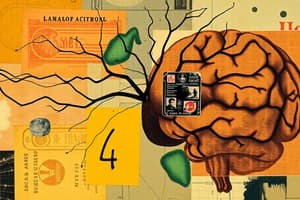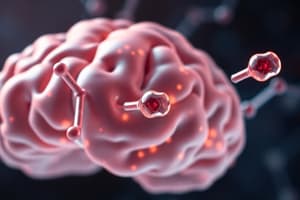Podcast
Questions and Answers
What effect does dopamine have during the manic phase of bipolar disorder?
What effect does dopamine have during the manic phase of bipolar disorder?
- It has no significant effect on neurotransmission.
- It directly causes depressive episodes.
- It decreases mood and energy levels.
- It has increased transmission. (correct)
What does the dopamine hypothesis suggest happens to key systems during increased dopamine levels?
What does the dopamine hypothesis suggest happens to key systems during increased dopamine levels?
- Dopamine transmission remains constant.
- There is secondary homeostatic down regulation. (correct)
- It leads to increased levels of GABA.
- There is an up regulation of serotonin receptors.
What happens to glutamate levels during the manic phase of bipolar disorder?
What happens to glutamate levels during the manic phase of bipolar disorder?
- They remain constant throughout all phases.
- They significantly increase in the left dorsolateral prefrontal cortex. (correct)
- They decrease to below normal levels.
- They have no known relation to mood changes.
What characterizes the end of the depressive phase in the dopaminergic system?
What characterizes the end of the depressive phase in the dopaminergic system?
What factor is suggested to disturb the normal lamination in the brain associated with bipolar disorder?
What factor is suggested to disturb the normal lamination in the brain associated with bipolar disorder?
Which statement best describes the role of environmental factors in bipolar disorder?
Which statement best describes the role of environmental factors in bipolar disorder?
What describes the Diathesis-Stress Hypothesis in relation to bipolar disorder?
What describes the Diathesis-Stress Hypothesis in relation to bipolar disorder?
What percentage of adults diagnosed with bipolar disorder report traumatic experiences in childhood?
What percentage of adults diagnosed with bipolar disorder report traumatic experiences in childhood?
Which factor is NOT mentioned as a source of possible stress that can activate bipolar diatheses?
Which factor is NOT mentioned as a source of possible stress that can activate bipolar diatheses?
What is a characteristic of the kindling hypothesis of mood disorders?
What is a characteristic of the kindling hypothesis of mood disorders?
What is a common misconception about the relationship between stress and the onset of bipolar disorder?
What is a common misconception about the relationship between stress and the onset of bipolar disorder?
Which statement is true about the connection between menstrual cycles and bipolar disorder?
Which statement is true about the connection between menstrual cycles and bipolar disorder?
Which factor is likely to reduce an individual's vulnerability to developing bipolar disorder?
Which factor is likely to reduce an individual's vulnerability to developing bipolar disorder?
What is one of the suggested biological factors that may contribute to bipolar disorder?
What is one of the suggested biological factors that may contribute to bipolar disorder?
How does the amount of stress needed to trigger bipolar disorder vary based on an individual's susceptibility?
How does the amount of stress needed to trigger bipolar disorder vary based on an individual's susceptibility?
Flashcards are hidden until you start studying
Study Notes
Neuroendocrinological Factors
- Dopamine: A neurotransmitter linked to mood regulation; its heightened activity occurs during manic phases of bipolar disorder.
- Dopamine Hypothesis: Increased dopamine leads to homeostatic downregulation of systems, causing reduced dopamine transmission in depressive phases.
- Cycle Restart: The depressive phase triggers homeostatic upregulation, potentially initiating a new cycle of mood changes.
- Glutamate Levels: Elevated glutamate is found in the left dorsolateral prefrontal cortex during mania, normalizing post-phase.
- GABA Increase: Possible early developmental disturbances affect brain structure layering, potentially contributing to GABA increase.
Environmental Factors
- Psychosocial Impact: Environmental factors significantly influence the development and recurrence of bipolar disorder, interacting with genetic predispositions.
- Life Events Correlation: Prospective studies indicate that recent life events and relationships affect onset and recurrence of both bipolar and unipolar mood episodes.
- Childhood Trauma: 30-50% of adults with bipolar disorder report childhood traumatic experiences, correlating with earlier onset, higher suicide risk, and co-occurring disorders like PTSD.
- Stressful Events: A higher number of stressful childhood events is reported among adults diagnosed with bipolar spectrum disorder, particularly from harsh environments rather than personal behavior.
Pathogenetic Models
- Diathesis-Stress Hypothesis: Suggests that individuals have inherent vulnerabilities (diatheses) that may predispose them to bipolar illness, influenced by genetic, biological, and experiential factors.
- Interaction Requirement: Vulnerabilities must interact with life stresses to activate the illness; higher inherent susceptibility requires less stress to trigger onset.
- Critical Stress Threshold: Individuals remain symptomless until a specific level of stress is reached, resulting in latent vulnerabilities.
- Stressor Sources: Various stressors, including trauma, family stress, depression, biological factors, and substance abuse, can activate bipolar vulnerabilities.
- Sleep Deprivation and Seasonal Affective Disorder (SAD): Notable triggers for mania; hormonal changes in women contribute to the prevalence of depressive episodes.
- Continuous vs. Initial Stress: Initial triggers of the illness may differ from those that perpetuate it; understanding these distinctions aids in treatment approaches.
- Biological Evidence: Findings from genetics, neurochemistry, endocrinology, and immunology support the biological basis of bipolar disorder.
- Kindling Hypothesis: Proposed by Post in 1992, suggests that stress can sensitively trigger mood disorders, gradually requiring less stress to induce episodes over time.
Studying That Suits You
Use AI to generate personalized quizzes and flashcards to suit your learning preferences.



